
-
Russia’s ally-sourcing pivot towards China, India and “non-aligned” allies to fight sanctions is driving global supply chain transformation, a new report says
-
Transport Intelligence says the “bifurcation” is ill-timed for trade globalization
-
The report says things could get a lot complicated as supply chains are “weaponized”
Ally sourcing is reshaping global supply chains, engendered by Russia’s pivot towards China, India and other “non-aligned” economies to fight Western sanctions for its invasion of Ukraine, says a new Transport Intelligence report.
This “bifurcation” is ill-timed for trade globalization on which most of the prosperity of the last few decades has been founded, said the new report by John Manners-Bell, Ti chief executive and director of Foundation for Future Supply Chain.
Ti said the report, “Ally-Sourcing Will Drive a Supply Chain Transformation,” was based on a survey of 129 senior logistics and supply chain executives it conducted with FFSC in June.
Ti said just 18% of the executives agreed that “globalization in its present form is here to stay” while 36% agreed that “security tensions between China/Russia and US/Europe will lead to new supply chain hegemonies based on ‘ally-sourcing’.”
Nearly half, or 46%, thought that “supply chains will become substantially more fragmented and localized as a result of protectionism, risk, costs and re-shoring,” Ti said.
Manners-Bell said the trade and finance sanctions imposed by the international community led by the US and Europe after Russia’s February 2022 of Ukraine had led to its exclusion from the majority of Western supply chains.
“This has necessarily forced Russia to pivot eastwards to countries which remain supportive of the Putin government or at least seek to retain neutrality,” Manners-Bell said, with China being its most important ally with their increasingly close leading to a surge in trade.
He cited China Customs data for January-May 2022 showing bilateral trade grew 28.9% to US$65.8 billion. Russian exports comprising oil, gas, soyabean grew 46.5% year-on-year, while Chinese exports to Russia rose just 7.2%. But these are higher-value-added mechanical, mobile phones, transport equipment and consumer products.
Russia’s need for high-tech products has become critical given US-led export controls since February blocking sales of semiconductors, IT equipment, electronics and computers to it.
South Korea and Japan signed up to the embargo while Taiwan is effectively bound by its constraints due to the application of the US “foreign direct product” rule, the report said. Manners-Bell said China is likely to play an important role in future supply of chips to Russia despite US pressure on Beijing against breaching the Western sanctions.
The sanctions have already had a far-reaching impact on the Russian economy, especially in its more advanced manufacturing sectors such as its aerospace industry, which has been hard hit with the delay of the flagship airline project, the MC-21, the report said.
Manners-Bell said Russian carmakers including national vehicle maker Avtovaz that are facing chip supply chain shortages are now in crisis.
India, long allied to Russia, has rejected US calls and took advantage of cheap Russian oil to build its inventory by importing a million barrels a day, or 25% of its energy imports.
Russia, India, Iran and a regional alliance including Central Asian republics, has facilitated the development of a transport corridor allowing containers shipment by rail from Russia via Iran and to India by sea. India has invested over US$2 billion in the scheme.
The report said it appears the largest segment of respondents believes the most likely scenario will be a regression to an era of tariffs, border controls and national industrial strategies to protect local markets.
“In times of stress and mistrust, it seems countries fall back on protectionist policies, even though these are often counterproductive,” Manners-Bell said.
“However, a sizeable proportion of those taking the survey believed that, rather than fragmentation, supply chains would coalesce around competing world powers with a bifurcation between the West and China… Through its Belt and Road Initiative, China has stolen a march on the rest of the world and the Europe and US are just waking up to the threat to supply chain security that this represents.”
As supply chains become increasingly politicized and “weaponized”, things get a lot more complicated, he said.




